Megan Bostic's Blog, page 55
July 12, 2011
Tuesday Tips:
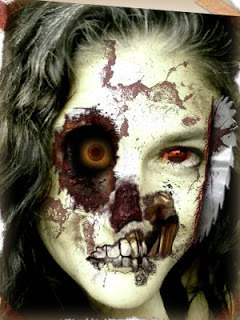 Okay, first off, I've zombified myself in honor of Carrie Harris's debut YA novel, Bad Taste in Boys, which releases today. It's next on my to read list, and I've heard only great things about it. And Carrie warned me that I shouldn't eat anything while reading it. Carrie's full of awesomesauce and a member of the Class of 2k11.
Okay, first off, I've zombified myself in honor of Carrie Harris's debut YA novel, Bad Taste in Boys, which releases today. It's next on my to read list, and I've heard only great things about it. And Carrie warned me that I shouldn't eat anything while reading it. Carrie's full of awesomesauce and a member of the Class of 2k11.Oh, and she's holding an auction to benefit the Giving Library at the University of Michigan C.S. Mott Children's Hospital. You can bid on signed books, query critiques, a book trailer created by me and more, all for a great cause. :)
Okay, onward. It's Tuesday Tip Day, and today, with the help of Punctuation Made Simple, we're talking about the semi-colon.
1) To Connect Two Sentences
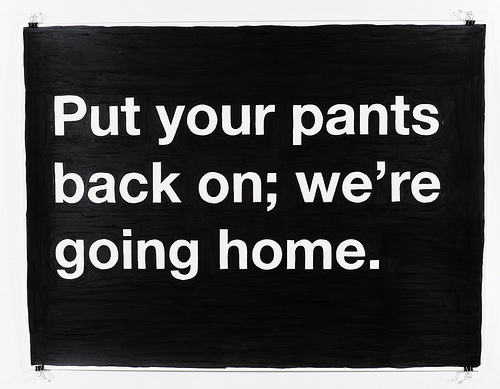 The semicolon is most often used to connect two sentences. Obviously, the sentences ought to be relatively close in content, but other than that you can connect any two sentences with a semicolon.
The semicolon is most often used to connect two sentences. Obviously, the sentences ought to be relatively close in content, but other than that you can connect any two sentences with a semicolon.As a communicator, you are always putting together complex items in your prose and showing how they relate to one another. A semicolon is an economical way to join two sentences, and therefore two ideas, so that your reader sees the relationship. For example:
Megan is awesome; she can do no wrong.Are you asleep yet? Wait until the next paragraph. (this is not an example of the semicolon, but my own personal opinion about this lesson)
The example above contains two sentences glued together by a semicolon. The second part of the sentence makes a comment on the first. Certainly, each sentence could be written as two sentences, but you wouldn't be expressing the close relationship between the two parts that you do when you use a semicolon.
The important point to remember is that you must have a complete sentence on both sides of the semicolon. If your second sentence begins with a conjunction (and, but, or, etc.), you do not need a semicolon because the conjunction and the comma that usually goes with it are equivalent to a semicolon. Instead, combine two full sentences with the semicolon. (Didn't they already say this?)Sometimes a sentence may begin with words like however, therefore, and nevertheless. If your second sentence begins with one of these words, and if it is indeed a full sentence, you still must use a semicolon to connect the two. An example:
However, this lessons is boring; nevertheless, it is also educational.
Never glue two full sentences together with only a comma. Grammarians call this sentence error a comma splice. A comma splice is considered ungrammatical because the reader begins reading the second sentence before realizing that the first sentence is completed. Readers are used to stopping at the end of a sentence, and they become disoriented when they find that they have unknowingly left one sentence and entered a new one. (Really? Does anyone really think this hard about reading?) This is why effective writers avoid the comma splice. Here is an example a of comma splice:
Megan has a great blog, she is always interesting to read.The example constitutes two sentences glued together with a comma. You can correct a comma splice by inserting a semicolon between the two sentences, by adding a comma to your conjunction, or, of course, by punctuating them as two sentences. Whichever way you choose, however, you must make sure your final drafts do not contain comma splices.
There is one instance in which a comma splice is considered acceptable. Occasionally, you may have a list of items that could stand alone as full sentences. (I wrote about the comma last week, so I'm not going over this again. Go read last Tuesdays blog if you want to find out about the comma)2) As Supercomma
As you know, you normally separate the members of a list with commas, as in this sentence:
I have just read Stupid Fast, The Pull of Gravity
, Popular
, and Illegal
.
The commas let the reader know where one item ends and the next begins. Sometimes, however, you have a list of complex items and one (or more) of the items already contains a comma. In such a case, the reader is likely to get confused about what is really a member of the list and what is not. You can avoid this confusion by making the semicolon a sort of"supercomma."
I've just traveled to: Scotsdale, AZ, Long Island, NY, and Leavenworth, WA.
This sentence contains so many commas, both between the members of the list and within them, that readers are likely to become confused. Instead, you can make the semicolon a supercomma between each of the members so that your meaning is clear:
I've just traveled to: Scotsdale, AZ; Long Island, NY; and Leavenworth, WA.
The second sentence is clearer than the first because the reader knows exactly where members of the list begin and end. You probably will not need to use a semicolon as a supercomma often, but if your sentence contains a list of items, one (or more) of which already contains a comma, you can clarify your meaning by using the supercomma.
And thus ends today's lesson on the semi-colon. Come back next Tuesday where we talk about the colon.
Published on July 12, 2011 06:04
July 11, 2011
Monkey Madness Monday
 Sometimes it is so hard to pick a monkey pic. There are so many cute ones out there.
Sometimes it is so hard to pick a monkey pic. There are so many cute ones out there.So, I decided on an impromptu trip to the ocean to gets some much needed R & R and some writing done.
I left on Saturday, the weather was perfect for the drive, blue clear skies, sun shining down on my hamster mobile.
I sang at the top of my lungs to the radio the whole way down, sunroof open, driving a little faster than I should have.
I arrived around 2:00 pm, and after debating fun vs. work, decided to get right in on the writing. I accomplished a few things in the hours I wrote. I cut about 3oo words from the novel, went through pages and pages of research, and got some words in. The word count doesn't really reflect the work that was done, but I did put a lot of time into it.
The novel took a turn I didn't expect, and now I find myself doing a lot of research on teen psych facilities. It's interesting for sure, but also very sad that teens find no recourse than to turn to violence, self harm, addictions, and eating disorders to get them through the day, landing them in these kinds of places. I expected someone like my main character to perhaps spend a few days in a place like this, but come to find out the average time for someone like her is about four months. Sad indeed.
Anyway, the day I got here was perfect, I worked, got a little sun, won money at the casino, took myself to dinner, and watched True Grit (I loves me some Coen brothers films).
Day two was mostly writing and research with a shopping trip in the middle. Birthday presents, gummy butterflies and salt water taffy, and monkey candle holders. I closed up shop around 4:00 pm, bbq'd myself a Gorgonzola burger and made homemade fries, then watched an SVU marathon into the night.
Here I am today. Cleaning the place up, catching up on email and facebook, then back to writing for a couple hours before heading home.
A perfect quiet weekend. I wanted to catch up on some other stuff too, video, blog posts, reading, but was immersed in my novel to do anything other than write (and the fun stuff).
Happy Monkey Madness Monday to you all, I hope you have a productive and fulfilling week.
Peace out,
Megan
Published on July 11, 2011 08:01
July 8, 2011
F³A: Change
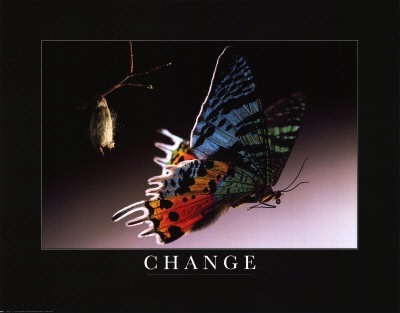 It's been a strange ride, this last few years. From the most horrible things to the most wonderful things: depression, nervous break down, book deal, divorce, dating, winning friends, losing others, and amazing trips to Disneyland, Sundance, Arizona, New York. Seriously, a tangible rollercoaster ride of life.
It's been a strange ride, this last few years. From the most horrible things to the most wonderful things: depression, nervous break down, book deal, divorce, dating, winning friends, losing others, and amazing trips to Disneyland, Sundance, Arizona, New York. Seriously, a tangible rollercoaster ride of life.It's strange how our experiences in life can change us so dramatically. They can change our feelings and emotions, our mental capacity. They can change us physically (my changes added 25 pounds to me, which I need to get rid of STAT!) Our experiences mold us into who we become.
I was once a submissive housewife. Raising kids, cleaning, doing laundry, grocery shopping. I was the ultimate soccer mom, a title I don't think I deserve anymore. Life has changed me. I'm stronger mentally and emotionally. I still do the household stuff, I have to because now it's just me and Thing One and Thing Two. I only have my kids half time. I miss them terribly when they're not with me. I have yard work. Lots of it, which of course can only be done when the weather permits, which is sporadic at best here in the PNW. I'm still a soccer mom, only the ultimate has changed. I no longer help at practice, I basically run the money and buy the uniforms. That part of it saddens me.
I used to screw around on Facebook all the time, and writer forums. Now since I've divorced and had to get a day job, there's really no time for that. I sometimes feel I'm losing those connections I made through my writing. That I'm not there as much and I'll be forgotten. I miss many of those people who I daily emailed, who made me laugh all the time. Those who I flirted with. But like I said, life and experience changes people.
Now I'm a marketing coordinator. That's my title at my day job. And I'm damn good at it. I've saved the law firm thousands of dollars a year already.
And I'm a writer. But along with that comes even more, and I don't think people know how much. We have to sacrifice our time. Because along with the writing comes making connections, and hours of editing, marketing, and promotion. Sometimes the latter takes so much time I don't have time to write. In fact, I haven't written a new word in weeks.
Yep, a rollercoaster. Do I have regrets? Of course, who doesn't. But this is the life I chose. My experiences have taken me down this path, and it's a path I want.
This is me. Writer, Marketer, Promoter, Editor, Mom, Maid, Cook, Assistant to myself.
Sorry for the lengthy discourse. It happens when I think too much.
I'll leave you with the Friday Nibbles.
Random iPod shuffle song (Thing Two finally found her iPod, well actually, her dad did): Nicki Minaj
 , Right Through Me.
, Right Through Me.Book of the Week: OyMG
 by Amy Fellner Dominy. Starting it today. I've heard it's wonderful. Amy is wonderful in her own right. She is a member of the Class of 2k11.
by Amy Fellner Dominy. Starting it today. I've heard it's wonderful. Amy is wonderful in her own right. She is a member of the Class of 2k11.Netflix of the Week: I'm sticking with Arrested Development
 . I just finished the entire series. A show that ended before it's time should have been up. It's hysterical
. I just finished the entire series. A show that ended before it's time should have been up. It's hystericalQuote of the Week: "If nothing ever changed, there'd be no butterflies." ~Author Unknown
Published on July 08, 2011 07:57
July 7, 2011
Thursday Theme Day
[image error]
Coffee.
In my superhero series, book three to be exact, a new coffee shop opens, and the kids start to frequent it.
In Never Eighteen , Kaylee works at Starbucks
, Kaylee works at Starbucks in the Barnes and Noble.
in the Barnes and Noble.
In Lockdown, the police officers are offered coffee by the shooter's mother.
In Cheesy, there is always discussion between Cheesy and her father over coffee.
Not so much in the current WIP.
Any other themes that frequently end up in your work?
In my superhero series, book three to be exact, a new coffee shop opens, and the kids start to frequent it.
In Never Eighteen
 , Kaylee works at Starbucks
, Kaylee works at Starbucks in the Barnes and Noble.
in the Barnes and Noble.In Lockdown, the police officers are offered coffee by the shooter's mother.
In Cheesy, there is always discussion between Cheesy and her father over coffee.
Not so much in the current WIP.
Any other themes that frequently end up in your work?
Published on July 07, 2011 09:33
July 5, 2011
Tuesday Tips: The Comma
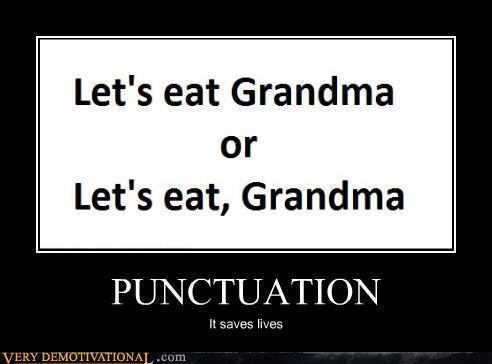 Learning when to use the comma, semi-colon, colon, ellipse, and em-dash. It's difficult for sure. I still don't have it down.
Learning when to use the comma, semi-colon, colon, ellipse, and em-dash. It's difficult for sure. I still don't have it down.Today we will talk about the comma. I tend to overuse it. I often use it in places it doesn't belong, and don't use it in places in which is does.
The comma tells the reader to pause. Here are some guidelines about using the comma, which I gathered from Punctuation Made Simple.
1) Between Items in a SeriesWhen you are listing three or more items in a sentence, simply place a comma between each member of the list. Here is an example:
Megan needs her computer, a notepad, a pen, a thumb drive, and a thesaurus in order to write a novel.In that sentence it's pretty clear where the comma should be used. However, modern writers believe that the conjunction (and, but, or) does the same thing as a comma: it marks the place between two items in the set so it's not needed between the last and second to last items. As a result, you now have the option to choose whether to include the final comma. If your list is rather complex, however, omitting the comma may confuse the reader about where the second-to-last item leaves off and the last begins. In this case, of course, you would want to include the comma in order to avoid confusion. 2) Between Two SentencesMany times a semicolon is used to connect two sentences. However, more often we glue two sentences together with a comma and conjunction (such as and or but). In fact, if you examine a document you have written recently, you are likely to find many such sentences; they're so common that you don't even realize you are writing them. When you do put two sentences together with a conjunction, you must also include a comma. That is, the conjunction and comma are equivalent to a semicolon when you're connecting sentences. Here are three examples:
Megan has just finished her novel, and she has begun work on another novel.The sentence above is made up of two sentences glued together with a comma and conjunction. For example, the first sentence is made up of the following:
Megan has just finished her novel.All you need remember is this: when you're connecting two sentences with a conjunction, you must also include a comma because the conjunction and comma work together as a team.
She has begun work on another novel.
Often you may use a conjunction but not have a complete sentence on both sides of it. In this case you do not need a comma. For example, you could easily rewrite the above sentences so that one part of each sentence is not a full sentence:
Megan has just finished her novel and has begun work on another novel.Because in the above examples you do not have full sentences on both sites of the conjunction, there's no need to include a comma.
One last bit of advice: if your sentence is very short (perhaps 5 to 10 words), you have the option of omitting the comma. Your reader can usually understand a short sentence more readily than a long one, and therefore you would not need a comma for readability.
3) To Attach Words to the Front or Back of Your SentenceMost of the sentences we compose really consist of a short core sentence with many details added to that core sentence. Frequently, we add information to sentences by attaching one or more words to the front or back of the core sentence. You don't need to memorize seven or eight rules naming each of the different structures you can add to your sentence. Instead, remember that when you add information to the front or back of a sentence, you will want to alert your want readers in order to help them clearly understand your message. Here are four examples:
In her bid for world domination, Megan spent every dime she had on a fully equipped laboratory.Even when you add one word, such as certainly, at the beginning of a sentence, you want your reader to know where the real sentence begins. This is why you place the comma there. 4) On Both Sides of a Nonessential ComponentOften, you will insert a group of words into the middle of a sentence. Sometimes this group of words will need to be set off by commas from the rest of the sentence, and sometimes you will not need commas. In order to tell whether you need commas, you must make a judgment about whether the added words are essential to the meaning of the sentence or whether they simply provide extra detail.
In order to tell a reader that a group of words is a nonessential component, you place commas in front and in back of the group of words. However, if omitting the group of words would drastically change the meaning of the sentence, then those words are not a component; rather, they are essential to the meaning of the sentence. In that case, you would not want to put commas on either side of the component so that the reader knows that those words are absolutely important to the meaning of the sentence. For example, look carefully at the following sentences:
Megan BosticIn the first sentence, the information about me being a young adult author has no bearing on the main idea of the sentence: that I'm releasing my first novel in January., who is a young adult author, will release her first novel
in January.
Authors who write for young adults often explore teen issues.
The second sentence contains information that is absolutely essential to the meaning of the sentence: "who write for you adults." If you were to place commas around these words, you would be telling the reader that the words constitute a nonessential component. For example, look at this sentence:
Authors, who write for young adults, often explore teen issues.This sentence tells the reader that the main idea is that "authors often explore teen issues". Not all authors explore teen issues, but by enclosing the information in commas you have said that they do.
And thus ends my (and Punctuation Made Simple's) lesson about the comma. Come back next week for a lesson about the semi-colon.
Published on July 05, 2011 10:10
July 4, 2011
Monkey Madness Monday
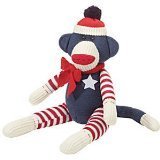 He's not a real monkey, but I love sock monkeys too.
He's not a real monkey, but I love sock monkeys too. I know, I know, I didn't blog Friday and you missed me terribly. Sorry. After almost a week of traveling for the day job, I suddenly had to prepare a visual presentation of what I learned for our firm retreat which was Thursday and Friday.
So Tuesday and Wednesday I hurriedly prepared outlines and a Powerpoint presentation, then first thing Thursday morning we were off to Leavenworth. The quaint German town here in Washington, not the prison.
Busy weekend and now here I am. Independence day has mostly been my least favorite holiday. People eat and drink to oblivion, it's normally crappy weather here in the PNW (today is beautiful though, hell must have frozen over). And then those drunk people light off fireworks. Whoever thought THAT was a good idea should have been bitch slapped.
While I was married (did I mention my divorce finally went through?) we'd go to the ocean and light our fireworks on July 5th when the beach looked like a garbage dump, but was mostly empty, me not being one for crowds, or obnoxious drunk people, or getting hit in the back of the head with a bottle rocket.
My kids are at the lake with friends and when they get home, they go to their dads. Today I'm spending it with a "friend" and his kids. I have no idea what we're doing. Probably just hanging in the backyard, bbqing, letting the kids swim (I got an above ground pool on the cheap) and catching some fireworks.
I'm wishing you all a happy Independence Day. Be safe, be sane, and don't blow your arm off.
Published on July 04, 2011 10:49
June 30, 2011
Thursday Theme Day
[image error]
Soccer (or futbol if you're anywhere but in America).
From now to January, my family lives, loves, and breathes soccer. It's only natural it would end up in my novels.
Someone is always a soccer player, be them a main character, or an aside.
In Never Eighteen , Austin was a soccer player until his illness made him too sick to play.
, Austin was a soccer player until his illness made him too sick to play.
Any other themes seem to land in your novels every time you sit down to write?
From now to January, my family lives, loves, and breathes soccer. It's only natural it would end up in my novels.
Someone is always a soccer player, be them a main character, or an aside.
In Never Eighteen
 , Austin was a soccer player until his illness made him too sick to play.
, Austin was a soccer player until his illness made him too sick to play.Any other themes seem to land in your novels every time you sit down to write?
Published on June 30, 2011 06:37
June 29, 2011
Wednesday Whimsy
I realize I didn't blog yesterday. Day job has me scrambling. I attended an SEO conference over the weekend and now I'm to give a presentation at the firm retreat Thursday. So I've been creating an outline and trying to get a Power Point presentation done. Arg!!
[image error] So here's a quick writing tip. Stay away from adverbs, especially the "ly" variety. Using too many adverbs is a rookie move. Believe me, everyone does it. Especially after dialogue. For example, "she said haughtily" or "he paced anxiously". Instead of using the adverb, use description of how she spoke, or how he paced.
Okay on to today's topic, GPS. I know, sounds boring. But when you're in Arizona and have no idea where you're going, it becomes fairly comical at times.
 My traveling partner and I were getting so fed up with the GPS and her snobby English accent that we gave her a name to personify her so we could yell and swear at her. Her name is Astrid.
My traveling partner and I were getting so fed up with the GPS and her snobby English accent that we gave her a name to personify her so we could yell and swear at her. Her name is Astrid.
Astrid, first of all, is outdated. Her maps did not have updated road information, and when you're in unfamiliar territory, that is sometimes really annoying.
Secondly, Astrid only gave us about a second to turn or exit. Kind of hard to exit in three seconds when you're in the left lane of a four lane freeway.
I don't know how many times we heard, "Recalculating."
Worst of all, Astrid took us down a dirt road in the middle of the desert with nothing around but tumbleweeds and coyote and told us we had reached our destination. Supposedly, this *points down* is where our conference was supposed to be.
 Needless to say, we yelled and swore and cursed her the majority of our trip, which is probably why she kept getting us lost.
Needless to say, we yelled and swore and cursed her the majority of our trip, which is probably why she kept getting us lost.
Astrid, you suck.
That is all, catch you tomorrow.
[image error] So here's a quick writing tip. Stay away from adverbs, especially the "ly" variety. Using too many adverbs is a rookie move. Believe me, everyone does it. Especially after dialogue. For example, "she said haughtily" or "he paced anxiously". Instead of using the adverb, use description of how she spoke, or how he paced.
Okay on to today's topic, GPS. I know, sounds boring. But when you're in Arizona and have no idea where you're going, it becomes fairly comical at times.
 My traveling partner and I were getting so fed up with the GPS and her snobby English accent that we gave her a name to personify her so we could yell and swear at her. Her name is Astrid.
My traveling partner and I were getting so fed up with the GPS and her snobby English accent that we gave her a name to personify her so we could yell and swear at her. Her name is Astrid.Astrid, first of all, is outdated. Her maps did not have updated road information, and when you're in unfamiliar territory, that is sometimes really annoying.
Secondly, Astrid only gave us about a second to turn or exit. Kind of hard to exit in three seconds when you're in the left lane of a four lane freeway.
I don't know how many times we heard, "Recalculating."
Worst of all, Astrid took us down a dirt road in the middle of the desert with nothing around but tumbleweeds and coyote and told us we had reached our destination. Supposedly, this *points down* is where our conference was supposed to be.
 Needless to say, we yelled and swore and cursed her the majority of our trip, which is probably why she kept getting us lost.
Needless to say, we yelled and swore and cursed her the majority of our trip, which is probably why she kept getting us lost.Astrid, you suck.
That is all, catch you tomorrow.
Published on June 29, 2011 06:53
June 27, 2011
Monkey Madness Monday
 So how cute is this little guy to the left? I want one!!!!
So how cute is this little guy to the left? I want one!!!!It's Monday. I'm in AZ. Went to an SEO (search engine optimization) conference. These guys knew what they were talking about. This will not only help me at my day job, but with my writing life as well.
I leave today to go back to the lovely gray, rainy Pacific Northwest, apparently having missed the two days of heat and sun while gone.
However, I can't wait to get back and test out my new internet skizzizles.
Have a wonderful Monkey Madness Monday everyone. Enjoy life.
Published on June 27, 2011 08:14
June 23, 2011
Thursday Theme Day
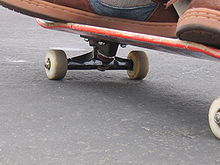 Theme interests me. I like to see what kind of things repeat themselves in writer's stories. I have a new one I hadn't noticed before. Skateboarding
Theme interests me. I like to see what kind of things repeat themselves in writer's stories. I have a new one I hadn't noticed before. Skateboarding . I remember in the first book I wrote, I superhero series (some of you may remember it from ABNA) there was a skateboarding character. Then in Never Eighteen
. I remember in the first book I wrote, I superhero series (some of you may remember it from ABNA) there was a skateboarding character. Then in Never Eighteen , one of Austin's best friends is a skateboarder.
, one of Austin's best friends is a skateboarder. Now in Sad, my main character Syd, is an avid skateboarder, along with her friend Zach.
I'm not really sure where the skateboarding theme came from. I guess I've always been interested in skateboarding. I like to watch it on TV. It looks so freeing. I've always wanted to try it, but I think I may be too uncoordinated (and maybe a little too old now).
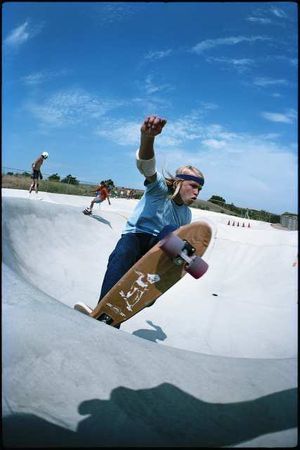 Bob Biniak, original Dogtown Z-BoyAnd I LOVED Lords of Dogtown
Bob Biniak, original Dogtown Z-BoyAnd I LOVED Lords of Dogtown .
. Plus, when I was younger, I kind of liked the skater boys. So there's that.
Tell me about one theme that reoccurs in your writing?
Megan
Published on June 23, 2011 09:07



